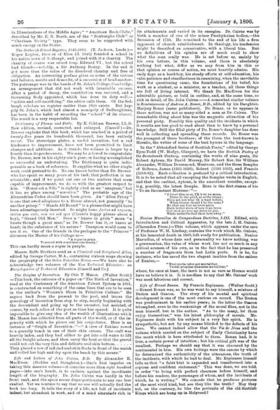Life of Ernest Renee. By Francis Espinasse. (Walter Scott.) —Ernest
Renan was, as he was wont to say himself, a mixture of Breton and Gascon. The story of his mental and spiritual development is one of the most curious on record. The Breton was predominant in his earlier years ; in the latter the Gascon triumphed, even to the weakenings of the moral fibre, not in the man himself, but in the author. "As to the many, let them enjoy themselves," was his latest philosophy of morals. Mr. Espinasse deals with his subject in a very fair spirit. He is sympathetic, but not by any means blinded to the defects of his hero. We cannot indeed allow that the Vie de Jesus and the volume which carried on the subject of Early Christianity have the merit which is here attributed to them. Renan had, it is true, a certain power of intuition ; but his critical gift was of the smallest. Perhaps we should say that it was obscured by the sentimental in him. His own feelings were the canons by which he determined the authenticity of the utterances, the truth of the incidents, with which he had to deal. Mr. Espinasse himself tells us that "a faint hint is expanded and transformed into a copious and confident statement." This was done, we are told, in order "to bring with perfect clearness before himself, and before his readers, the personages of whom, and the incidents of which, he is writing." We concede that he produces pictures of the most vivid kind, but are they like the truth ? May they not, on the contrary, be like the portraits of the old Scottish Kinn which are hung up in linlYrood P














































 Previous page
Previous page